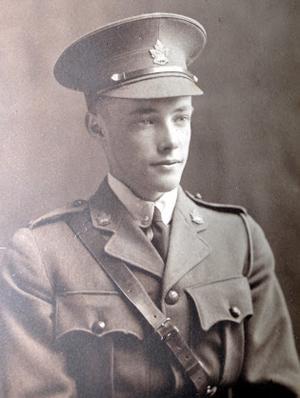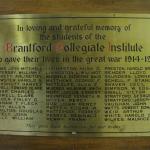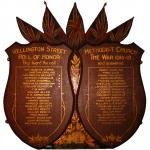Circumstances of Casualty: Killed in Action.
Location of Unit at Time of Casualty: Lens (Hill 70).
BX August 20, 1917
Austin Arlington Beckett Killed in Action
“Killed in action” was the fateful word received today by Mr. and Mrs. H.B. Beckett in regard to their third son, Lieut. Arlie Beckett, who went overseas with the 215th Battalion and was drafted to the Second Division. The young hero, who was in his 20th year, was killed near Hill 70, on August 15. A recent letter told of his having received a birthday box at four o’clock on the morning of the day he wrote home, and he was then in excellent spirits. Prior to enlisting Lieut. Beckett was employed in the office of the Pratt and Letchworth foundry. He was one of the best athletes and most brilliant of Brantford’s student sons. He had been a member of the Collegiate Institute rugby and basketball teams, and was prominent in other sports. He also showed great brilliance in the Collegiate here, having passed his matriculation with honors, mathematics being his strong point. Four brothers and one sister survive him: Ross, who will shortly leave for Y.M.C.A. work at Valcartier Camp and then go overseas; Clarence in the Bank of Hamilton; Morley, and Pearl and Percy, twins all at home.
BX November 23, 1917
Details of Hero Death of Lt. Arlington Beckett – Capt. David L. Keith Pays Tribute to Local Officer
The following letter has been received by Mrs. H.B. Beckett from Capt. David L. Keith to whose company Lt. A. Beckett was attached:
Lieut. Beckett was in my company. I first met him at the base and then later when I was cleared from the hospital. I found him in “B” Company. All the officers were new to me. I had been away from the battalion for two months. Out first bit of work was holding the line in the Lens sector. “B” Company was in close support, and it was our work to get familiar with the line in preparation for the intended attack. On Sunday, July 15 your son had his first real job, and I must say he did it like a veteran. He took out 50 men into No Man’s Land to make a reconnaissance. He got the information wanted and brought his men back without a casualty. Splendid work. On July 17 we moved back into support in Levin. Here we were very comfortable, and I was able to have a little dinner party on July 18, my birthday. The next day your son had to go back to make ready some houses for the coming show. This work was very trying, but he did it well and without complaining.
This work took about a week. Then he rejoined us at Bouvigny, where we trained over the tapes till August 7, when we moved up into the battle area. On the eighth our billet was all blown in. Fortunately we had all gone out for better protection. On the 10th we were back in Bouvigny again, and on the 11th the battalion had a service out in the open. On Monday we had our final go over the tapes and Tuesday was given over to final preparations. It was on this day that your son and I went to see the doctor about his throat that was troubling him. ‘I can send you to the base, if you want to go, but if you want to go into the show, you may, I do not think it will do you any harm.’ Your son decided to go with his men. About 7pm “B” Company started on Tuesday, August 14, on its long walk to get into position. On the way we all got soaked, as it rained very heavily. When we got to within a mile of our staging ground I met your son leading his men of No. 7 platoon. Here he pleased me very much. They were being held up by a barrage of gas shells. He asked me if he could go another way. My confidence in him was so great that I told him I did not mind which way he got to the staging spot so long as he got there. He did not waver a moment. It seemed such an easy matter for him to decide and to do the right thing.
We met again at 12.30 on the staging ground. He had got his men that far and no casualties. Here he gave his men their issue of rum. Then we all shook hands. Zero hour was at 4.25 am., – quite dark. We started off on our attack as soon as the guns opened up. Our advance was for some 1,500 hundred yards among ruined houses. When we got to our objective Sergeant Coombe came running up to me with tears in his eyes and told me of your son’s death. A shell killed him instantly. We had his body put on a stretcher, and it was taken out and buried at, I think, Aix-Noulette. His last words were to Sergeant Coombe, and if I remember right it was about his revolver, which he wanted his sergeant to have. I had picked your son to be the finest officer I had. He was cool, deliberate, and very wise in his decisions. To lose him was a great blow to me, the worst knock I have had in my whole life. I loved the boy. I knew I could depend on him no matter what happened. His men called him the ‘Prince of Wales,’ because he was so young and because the name put into expression their esteem for him. They told me more than once that they would follow him anywhere. As far as my own feelings went, I would have taken it as a great compliment to have had such a man to work for me, to be my colleague or to work under. In this terrible fighting business one gets to know a man as it would never be possible in civil life, and I knew your son to be a great man. Your son was killed about 5.15 am on August 15. We had 43 casualties in the start of the attack until we got out of the line on Monday, August 20; the company did wonderful work, and especially No. 7 platoon. Sergt. Coombe for his good work was awarded the D.C.M.
After the battle I was quite sick, and the C.O. thought that I ought to have a rest, so now I am town major of a much wrecked village. Some time I hope I may be fortunate enough to meet you. If there is anything I can do, Please let me do it.
BX September 17, 1917
Conscription Was Endorsed – Rev. Dr. G.W. Henderson’s Only regret That it Was Delayed so Long – Memorial Service – “All the fault I have to find with it is that it was not enforced two years earlier.”
So declared Rev. Dr. G.W. Henderson, pastor of Wellington Street Methodist Church, last evening, referring to the conscription measure which has been made law. The comment was made during a splendid sermon, in memoriam of three members of the church – Pte. Melvin Bunston, Corp. Norman Dunningham and Lieut. Arlington Beckett, who had made the greatest sacrifice possible, that the honor of the Empire be maintained and that Christianity’s greatest foe be overthrown. The Great War Veterans’ Association paraded to the church in a body, headed by the Dufferin Rifles band, the entire portion of the church being reserved for them. During the service the choir rendered appropriate music, Mrs. Leeming and Mr. Sanderson being soloists, while Mr. Thomas Darwen played “The Dead March in Saul.”
Dr. Henderson commented that they had gathered to do honor to the fighting men and to the fallen heroes. There was a refrain being sung to 10,000 Canadian homes “Keep the home fires burning, but in three cases in the homes of members of the church their boys would not come home. Private Bunston was a member of the first contingent and was reported missing soon after reaching France. The news had much to do with the hastening the death of the mother. A month after word was received that he died, insane a prisoner of the Germans. He was an active member of the Young People’s Society. His brother Harry enlisted to fill the gap caused by his brother’s death. Corp. Norman Dunningham was killed in action in October 1916 while leading 54 men with new ammunition. Just before going up, he had taken out his Bible and commented, “Isn’t it wonderful, we have God with us no matter where we go,” in one short hour he was with his God. Lieut. Arlington Beckett was killed on August 15 at Hill 70, Lens. Just Saturday his people had received a letter from him, written the day before his death, in which he commented that no one could tell what the next 24 hours might bring forth. He was ready, for him to live with Christ, to die was gain.
The pastor reviewed the commencement of the war, showing conclusively that the Central powers had brought it on, and that Britain with consideration for her honor and for the protection of small nations, could not have done otherwise. They were fighting for the sanctity of womanhood, the safety of their children, the right of the small nations to live, the integrity of the state, the freedom of their homes and the defense of righteousness. The war must continue until Prussian military domination was overthrown.



